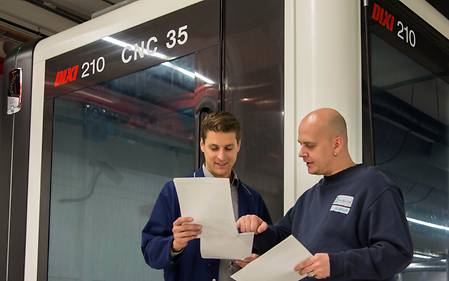First step in the nanoscale
The use of the highly accurate universal milling machine DIXI from DMG MORI in the production process of the Berliner Glas Group enables the production of large-scale, high-precision optical components.
Light is a high-tech tool. It enables state-of-the-art applications in medicine, high-precision measuring and it serves as a reliable carrier of information in communication. These are just three examples of the areas in which the Berliner Glas Group has been operating for over 60 years. The group consists of medium-sized enterprises that with their experience and over 1,100 employees consistently push the development of optical technologies and technical glass processing. The high standards of quality require extensive expertise also in production and most especially innovative manufacturing technologies. In order to achieve the final accuracies in the nanometre range, the Berliner Glas Group relies on high-precision machining centres, like the DIXI 210 from DMG MORI, right at the beginning of the process chain.
The Berliner Glas Group of today has very little in common with the simple glass wholesale company founded by the father of Dr. Herbert Kubatz in 1952. The portfolio encompasses optical key components, assemblies and systems – including prisms, lenses, measuring devices and cameras. The company generates 90 percent of its turnover with such high-tech products. Leading producers from the semi-conductor industry trust in the quality of the Berliner Glas Group as do suppliers of medical technology and manufacturers of displays. With mirrors for satellite modules they even have some sophisticated space travel applications.
Its focus on the technology sector means that the Berliner Glas Group undertakes continuous further development and consistently searches for new market sectors. This has led to consistent growth and expansion abroad in the last decades – it has locations in the USA, Switzerland and China – which will help strengthen the position of the company in the future. The Berliner Glas Group remains loyal to its headquarters in Berlin Neukölln, where over half its employees work. Products are developed here and produced in a complex process chain with all the necessary technical competence. The Berliner Glas Group ensures its future staffing needs itself with a training quota of eight percent.
Maximum quality through process-specific expertise
The majority of its employees work in production and assembly. Whereby metal cutting has a large share in the added value chain. “High-precision milling and grinding comes at the beginning of our process chain and is the basis for further refining steps with which we achieve a level of evenness for large components in the nanometre range”, explains Gregor Hasper, Head of Optical Production Technology. In order to achieve such precision it is necessary to machine the workpieces made of glass, Zerodur or high-performance ceramics with an accuracy of a few micrometres at a very early stage. With a vertical integration of 100 percent for glass-ceramic structural components the Berliner Glas Group is responsible not only for machining but also for polishing, fine correction and surface coating as well.
Machine tools from DMG MORI have formed the mechanical basis at the Berliner Glas Group since the 1990s. 5-axis machining centres from the DMU and DMC series, ULTRASONIC machines and – since last year – a DIXI 210. The Berliner Glas Group uses this high-precision universal lathe for precision grinding. Produced in Le Locle, the DIXI machines stand for Swiss precision within the DMG MORI Group and worldwide. Their volumetric accuracy is better than 35 µm. This puts them in a class of their own. Their positioning accuracy is 4 µm. DMG MORI achieves this high level of precision with manual scraping of the guide contact surfaces and systems. Over 500 hours of this precision handcraft ensures a straightness and evenness of the linear guides of 4 µm. In addition the FEM-optimised portal design with a 3-point support with GGG60 cast parts ensures maximum rigidity and stability. A key factor for Gregor Hasper: “The rigidity guarantees low-vibration machining and this in turn minimises subsurface damage.” If there is greater damage reworking is too cost and time consuming or even impossible.
“We decided on the DIXI 210 because it will support us with large-volume projects in the future”, says André Pisch, the person responsible for process technology. Travel paths of 1,800 x 2,100 x 1,250 mm mean that they can machine cylindrical lenses with lengths of up to 2,000 mm, which are used subsequently in the production of displays. He then goes on to speak about the long-term stability and good temperature compensation: “It is of particular importance especially in series production that the DIXI 210 operates with permanent accuracy and reliability, because our runtimes are often several hours or even days.” In view of the high cost of the material, any errors and resulting rejects entail financial losses. “We are also bound by tight delivery times”, adds André Pisch.
Success through development partnerships
Gregor Hasper and André Pisch, but also the workers on the machine, are quite evidently satisfied with both the performance the DIXI 210 and the machining results. As the Berliner Glas Group also keeps an eye on the future in this respect, it would like to continue the close cooperation with DMG MORI. “Our aim is, of course, to work with ever greater accuracy in this process step as well. That is why the further development of the DIXI technology is of great importance for us”, says Gregor Hasper. So he could well envision developing the existing machines further for new requirements or allowing feedback from production to flow into future projects and cooperating even more intensively with developers and technical sales in the very early stages. An approach that the Berliner Glas Group also pursues with its customers in order to ensure timely optimisation of the product design.



